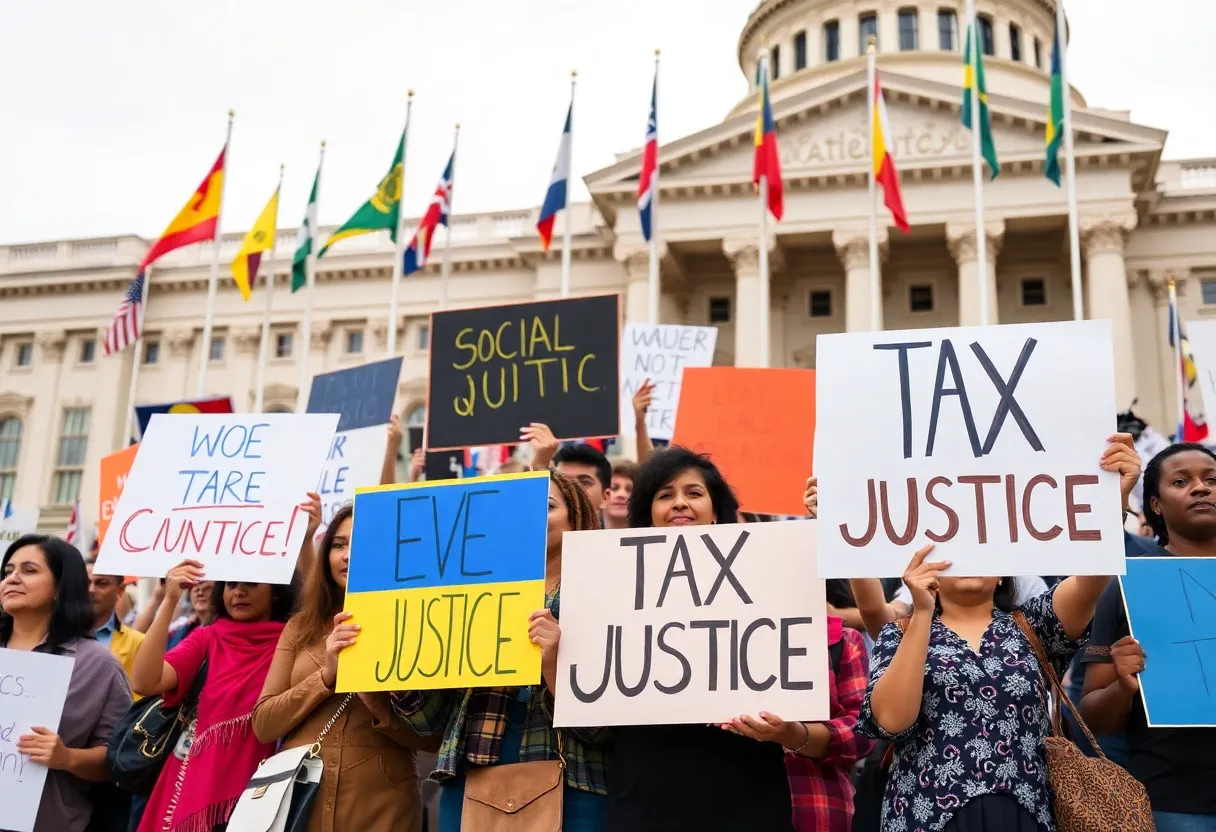News Summary
On May 29, 2025, advocates rallied at the Rhode Island State House, urging for a 3% income tax surcharge on high-income earners. This tax aims to generate $190 million in revenue to address budget shortfalls. The funds would primarily support critical services such as public transit, Medicaid funding, and educational programs for non-English-speaking students. Despite legislative concerns about potential fallout on business competitiveness, advocates stress the necessity of a fair tax system to alleviate the burden on lower-income residents.
Rhode Island Advocates Rally for Tax Increase on Wealthy Residents Amid Budget Discussions
On May 29, 2025, approximately 100 advocates gathered at the Rhode Island State House to press for a 3% income tax surcharge on individuals earning over $625,000. This proposed tax is projected to generate about $190 million in new state revenue. Rally participants chanted the slogan, “Tax the rich!”, calling for measures aimed at addressing critical budgetary shortfalls and funding essential public services.
The additional revenue, according to the advocates, would primarily be allocated to resolve a $32 million deficit for the Rhode Island Public Transit Authority (RIPTA). Furthermore, it aims to mitigate potential cuts to important programs such as the Supplemental Nutrition Assistance Program (SNAP), Head Start initiatives, and Medicaid. Advocates also emphasized the need for increased funding for multilingual education to support non-English-speaking students and to address the state’s ongoing healthcare crisis.
Before the rally, Rhode Island Attorney General Peter Neronha held a press conference where he proposed legislation, Bill H6373, which would increase Medicaid reimbursement rates to align with 100% of Medicare rates starting July 1, 2025. This proposal highlights the urgency of resolving funding issues in healthcare and the importance of supporting vital services for Rhode Islanders.
Organizers and Supporting Groups
The rally was organized by a coalition of influential groups including the RI AFL-CIO, Climate Action Rhode Island, the National Education Association of Rhode Island, the Economic Progress Institute, the Revenue for Rhode Islanders Coalition, the RI Working Families Party, SEIU-1199, Indivisible RI, and Reclaim RI. Collectively, they emphasize the inequities currently present in the tax system, where the top 1% of earners in Rhode Island contribute only 8.6% of their income in taxes, in stark contrast to low-income earners who pay over 13%.
Concerns and Legislative Context
Despite significant support, there are concerns from legislative leaders regarding the implications of a tax increase, particularly given uncertainties about federal funding. Key figures in the Rhode Island Legislature have highlighted potential risks to business competitiveness and the possibility that wealthy individuals may relocate to states with lower tax rates.
Discussions held during the Senate Finance Committee revealed that the proposed tax could provide substantial funding for a variety of essential programs, including public schools, meal services for students, mental health initiatives, and poverty alleviation efforts. Advocates argue that the existing tax structure is inequitable, with lower-income earners disproportionately affected compared to affluent taxpayers.
The proposed tax measures, if passed, would take effect on January 1, 2026. House Speaker K. Joseph Shekarchi acknowledged the need for a balanced approach as the state grapples with budgetary challenges. As debates around tax policy continue, the Economic Progress Institute asserts that raising taxes on the wealthy will not necessarily lead to significant out-migration, countering claims that such policies would harm the economy.
Rhode Island’s current tax framework relies on a three-tiered income tax system which was established in 2010, lowering the top rate from 9.9% to 5.99%. With ongoing discussions around the proposed tax increase, the Senate Finance Committee plans to hold further discussions, making it a crucial point of consideration during the current budget negotiations. As Rhode Island advocates continue their push for greater taxation on wealth, the outcome remains uncertain, reflecting broader debates occurring across the nation regarding fiscal responsibility and social equity.
Deeper Dive: News & Info About This Topic
- Providence Journal: RI Millionaires Tax Advocates Push Lawmakers Amid Budget Negotiations
- Boston Globe: RI Considers Taxing the Rich
- Rhode Island Current: Millionaires Tax Proposal Gets Warm Reception
- Google Search: Rhode Island Tax Structure
- Realtor: Rhode Island Boat Property Tax
- Wikipedia: Income Tax in the United States

Author: STAFF HERE PROVIDENCE WRITER
The PROVIDENCE STAFF WRITER represents the experienced team at HEREProvidence.com, your go-to source for actionable local news and information in Providence, Providence County, and beyond. Specializing in "news you can use," we cover essential topics like product reviews for personal and business needs, local business directories, politics, real estate trends, neighborhood insights, and state news affecting the area—with deep expertise drawn from years of dedicated reporting and strong community input, including local press releases and business updates. We deliver top reporting on high-value events such as WaterFire, Rhode Island International Film Festival, and Rhode Island Comic Con. Our coverage extends to key organizations like the Greater Providence Chamber of Commerce and Providence Warwick Convention & Visitors Bureau, plus leading businesses in finance and manufacturing that power the local economy such as Citizens Financial Group and Textron. As part of the broader HERE network, we provide comprehensive, credible insights into Rhode Island's dynamic landscape.





